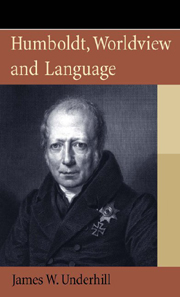Book contents
5 - Sapir
from Part I - Language and World
Published online by Cambridge University Press: 12 September 2012
Summary
It is truly surprising that a thinker of such versatility as Edward Sapir (1882–1939) should come to be reduced to the minor partner in the Sapir-Whorf hypothesis. Sapir does have his defenders, but these tend to be specialists of his own work and, on the whole, little place has been found in contemporary linguistics for Sapir's theory of personality, for example, a theory in which he strove to define the patterns and forms common to both the psychological functioning of the individual and to culture as a whole. Sapir's mind was finely tuned to the examination of details and he never lost sight of the role played by the part within the whole of the language system. This is probably what helped Sapir recognise that the individual should always be maintained at the centre of any discussion of social interaction. Though he did perceive clearly the importance and the convenience of talking of groups and society as a whole when investigating psychological functioning, he was careful to remind us that the representations we construct of those pluralities are always derived from the model of the individual. To speak of how a community thinks or feels is misleading: though it can allow us to formulate meaningful descriptions and to distinguish between different societies, ultimately such sweeping statements cut us off from the study of actual living, breathing, interacting, speaking men and women. For Sapir, to speak of the unconscious of a society was no more than a personification since, as he wittily declared, ‘society has no more of an unconscious than it has hands or legs’ (Sapir 1985: 545).
- Type
- Chapter
- Information
- Humboldt Worldview and Language , pp. 25 - 32Publisher: Edinburgh University PressPrint publication year: 2009



